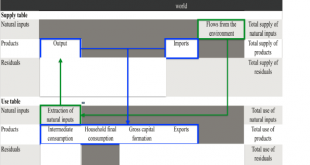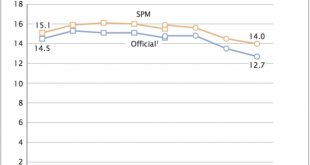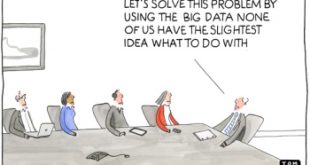By Yanis Varoufakis. Source I concede that there are issues over which I would welcome the Italian President’s use of constitutional powers that (in my humble opinion) he should not have.(*) One such issue is the outrageous policy of the Lega and the promise of its leader, Mr Salvini, to expel five hundred thousand migrants from Italy. Had President Mattarella refused Mr Salvini the post of Interior Minister, on the basis that he rejects such a monstrous project, I would be compelled to...
Read More »Doubting the benefits of trade: a somewhat fuzzy discussion.
There is a somewhat fuzzy discussion going on about exports, imports and the economy: are (net) exports (imports) good for Australia a country, or not. Look here. And here. It is a complicated question, which made Steve Keen state: “I don’t want to see, and obviously won’t tolerate, further arguments about exports as costs and imports as benefits. I want to see a detailed double-entry bookkeeping exploration of the monetary (and capacity-utilization/real GDP/physical) implications of...
Read More »Once again, the Oil Price Scare
from C. P. Chandrasekhar and Jayati Ghosh The news last week that prices of Brent Crude oil (which is used as a global benchmark) had crossed $80 a barrel in some markets must have created shock waves in policy circles of many countries, especially India. Many oil-importing countries had grown comfortable with – and even complacent about – the relatively low oil prices that persisted after their precipitous drop in the middle of 2014. As Chart 1 shows, average oil prices feel very sharply...
Read More »Why the p-value is a poor substitute for scientific reasoning
from Lars Syll [embedded content] A non-trivial part of teaching statistics is made up of learning students to perform significance testing. A problem I have noticed repeatedly over the years, however, is that no matter how careful you try to be in explicating what the probabilities generated by these statistical tests really are, still most students misinterpret them. This is not to blame on students’ ignorance, but rather on significance testing not being particularly transparent...
Read More »Understanding Macro III: The rule of corporations
from Asad Zaman In previous parts of this article (Understanding Macro I & Understanding Macro II), we have described how strict financial regulation and Keynesian prescriptions for full employment brought prosperity for the masses, but reduced corporate profits. This last part describes the successful counter-attack by corporations which reversed this state of affairs, causing a massive rise in the income shares of the wealthy 1% and a decline in the fortunes of the bottom 90%. In...
Read More »Donald Trump’s big pharma first agenda
from Dean Baker After handing huge tax cuts to the country’s richest people and taking away health care insurance for millions, Donald Trump took another giant step toward abandoning his populist agenda last week. Instead of having Medicare negotiate to bring drug prices down, Trump put out a plan that is focused on making foreign countries pay more for drugs. The most immediate and direct effect of this effort, insofar as it succeeds, will be to increase the profits of the major US drug...
Read More »Krugman’s Gadget Keynesianism
from Lars Syll Paul Krugman has often been criticized by people like yours truly for getting things pretty wrong on the economics of John Maynard Keynes. When Krugman has responded to the critique, by himself rather gratuitously portrayed as about “What Keynes Really Meant,” the overall conclusion is — “Krugman Doesn’t Care.” Responding to an earlier post of mine questioning his IS-LM-Keynesianism, Krugman write: Surely we don’t want to do economics via textual analysis of the masters....
Read More »Poverty of anti-poverty (3 graphics)
from David Ruccio The majority of government expenditures in the United States go towards social insurance and means-tested transfers.* And the good news is, they work. According to recent report by Bruce D. Meyer and Derek Wu, Social Security cuts the poverty rate by a third—more than twice the combined effect of the five means-tested transfers. Among those transfers, the Earned-Income Tax Credit and food stamps (officially, the Supplemental Food Assistance Program) are most effective....
Read More »Statisticism — confusing statistics and research
from Lars Syll Coupled with downright incompetence in statistics, we often find the syndrome that I have come to call statisticism: the notion that computing is synonymous with doing research, the naïve faith that statistics is a complete or sufficient basis for scientific methodology, the superstition that statistical formulas exist for evaluating such things as the relative merits of different substantive theories or the “importance” of the causes of a “dependent variable”; and the...
Read More »Are we at full employment? taking issue with Paul Krugman
from Dean Baker Paul Krugman had an interesting blog post this morning in which he attributed the continuing weakness of wage growth to an increase in monopsony power. I’m a skeptic on this one, since the collapse in wage growth happens to coincide with the Great Recession. The big issue is whether the labor market is again back to its pre-recession level of tightness, when wages were rising considerably more rapidly. To argue the case that it is, Krugman follows Jason Furman in...
Read More » Real-World Economics Review
Real-World Economics Review







